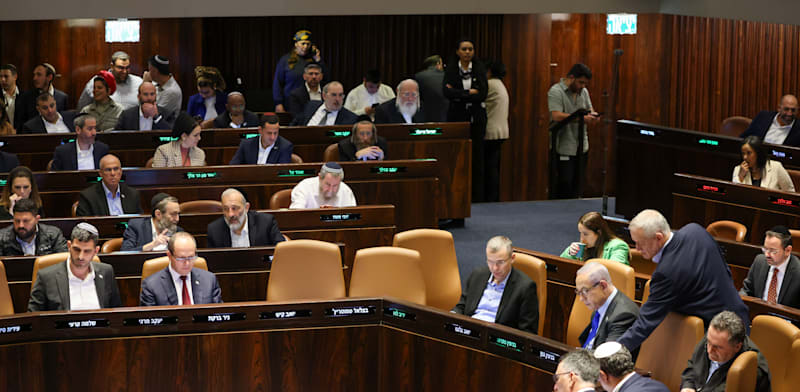The Finance Ministry is currently concerned about arguments between Finance Minister Bezalel Smotrich and his top officials over the issue of cuts in the revised budget for 2024, including whether to raise taxes to finance the war. The struggle evolved into a campaign by the National Religious Zionism party, led by Smotrich, against « out of touch » officials in the Finance Ministry.
It could be that the quarrels are superfluous, since the new budget risks never being voted on. At least that is what the president of the National Economic Council, Professor Avi Simhon, is proposing, several sources from the Ministry of Finance told « Globes ».
To get around the legal obstacle
This will not be the first time that the Netanyahu government, backed by its veteran economic adviser Simhon, has blocked the approval of the state budget during an economic crisis. The previous time was during the Covid pandemic, when Israel Katz became the first finance minister in Israeli history not to pass a budget, mainly due to Netanyahu’s political calculations. As an alternative, the government transferred more than 100 billion shekels to extrabudgetary “coffers” and widened the budget deficit. The Ministry of Finance is concerned that a similar exercise is underway.
The implementation of such an idea means that the administration of the country in the coming year would be done through the biennial budget approved in May 2023, which obviously did not include the needs of the war. But there is a legal problem. If a new budget is not adopted, the government will be forced to present a huge budget surplus plan of 67 billion shekels, according to Finance Ministry calculations. Otherwise, it will be necessary to make massive and general cuts in the budgets of ministries.
Simhon has a solution to get around the legal obstacle. The government would legislate to exceed the deficit limit set in the basic budget law. This would prevent a widespread reduction. Instead of constructing a new budget, the government would set up an extra-budgetary fund, which would be largely financed by an increase in debt. The fund would be created for defense purposes, but the government might be able to apply it to other expenses indirectly related to the war.
How to fill a deep hole of 67 billion shekels?
In practice, Simhon represents Netanyahu in budget negotiations with the Finance Ministry. Freezing budget discussions will allow the government to avoid painful streamlining measures requested by the Finance Ministry, such as canceling coalition funds and closing “unnecessary” ministries. Simhon is likely willing to compromise at most on a reduction of about 5 billion shekels, or less than 1 percent of the overall budget of more than half a trillion shekels. Simhon is also not interested in talking about removing tax benefits. He also does not fear that the deficit will reach high levels, because according to him, the Israeli economy will experience a rapid recovery after the war, as happened after the Covid pandemic.
RELATED ARTICLES
The 2024 budget discussions currently taking place at the Finance Ministry are focused on how to close a deep budget deficit of 67 billion shekels. This pit was dug at the bottom of the state coffers mainly because of the war, but it began to form even earlier, during the era of the government’s judicial reform. Without budgetary coverage for this colossal amount, the deficit will reach a dangerous level of 6%, according to the latest forecasts from the Ministry of Finance.
Finance Ministry officials want to make up about half of the deficit by cutting the government budget and raising revenue through higher taxes on the public. The balance, for lack of any other choice, would be increased by the issuance of bonds.
On the other hand, Smotrich proposed filling the hole with a combination of 85-90% loans at the cost of an increase in the deficit, as well as minimal rationalization measures. Simhon’s proposal is even more extreme and practically does not limit the deficit. He would spend as much as he can, even if the result was a deficit of about 6 percent, which represents a deficit of about 115 billion shekels in state coffers.
It would be too simplistic to describe the fight over the 2024 budget as a bilateral fight between Smotrich and senior officials at the Finance Ministry. On the one hand, there are those responsible who support classic budgetary policy which advocates rigorous budgetary rigor. At the other end is the “optimistic” approach, according to which there is enough money for everything, with Simhon as the most optimistic. Even if Smotrich wanted to pass a responsible budget, it is very doubtful that he would get Netanyahu’s support for it. Smotrich therefore prefers not to be the bad guy and emphasizes that any reflection on painful reductions is the sole responsibility of those responsible.
In reality, officials at the Ministry of Finance do not agree. Among them are different shades of opposition to the intentions of the political level. If to the right of Smotrich on the ideological axis is Simhon, then just to his left is the Director General of the Ministry of Finance, Shlomi Heisler.
Heisler is a mediating and conciliatory figure, trying to pull Smotrich in a more restrained direction, and is not even afraid of a proposal to increase VAT by 0.5% to help balance the budget. Heisler is pulled to the left by the head of the budget division Yogev Gardos.
Gardos is under pressure within the division, from some of his deputies and coordinators, who believe that the budget division should more resolutely oppose the political intentions of using the war as an opportunity to distribute budget funds. wild way.
Sources within the Finance Ministry say that behind all the struggles, the gaps between Smotrich and the budget division aren’t really that big. According to them, Smotrich is trapped. He knows that if he goes to the budget department, he won’t really be able to deliver them the goods because of Netanyahu.
Published by Globes, Israel Business News – fr.globes.co.il – December 26, 2023.
© Copyright of Globes Publisher Itonut (1983) Ltd., 2023.




